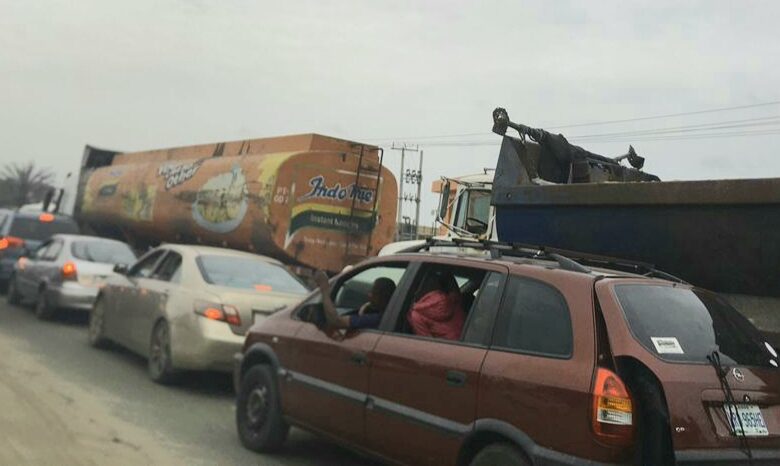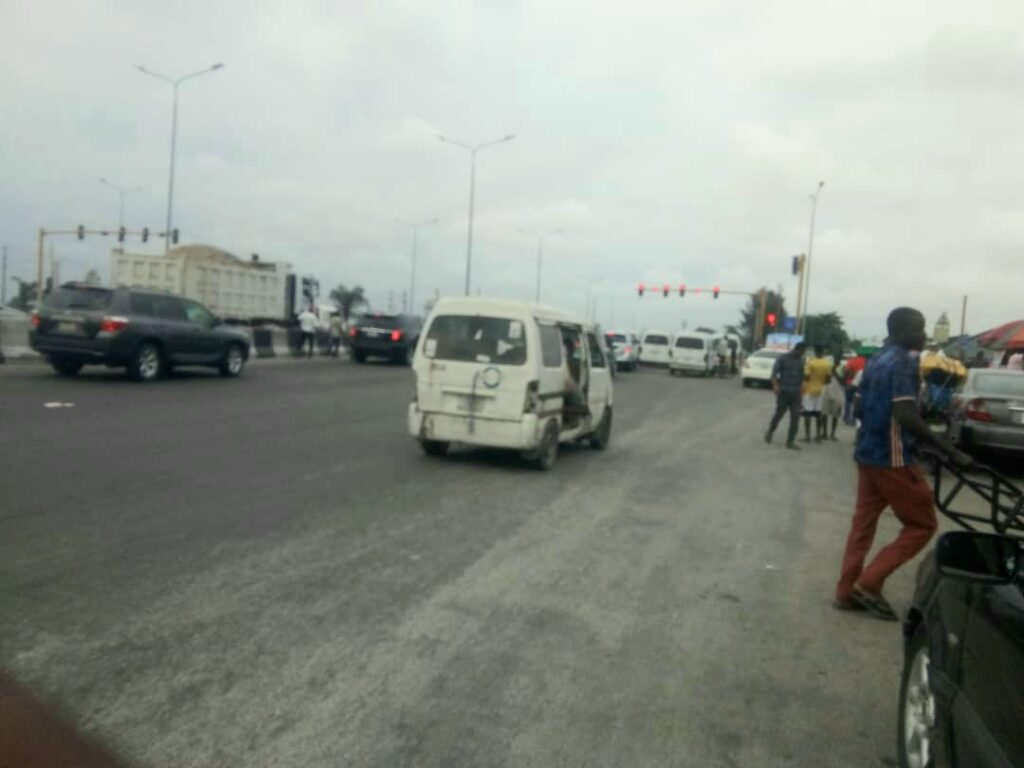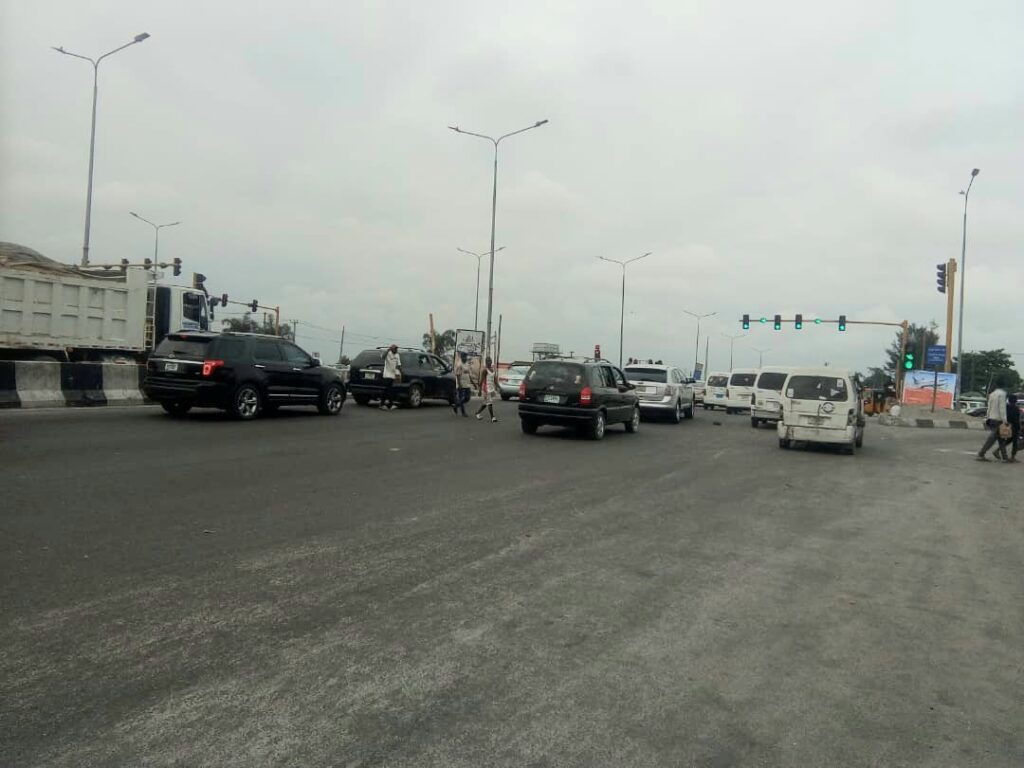Traffic Robberies, Missing Persons… The Face Of Insecurity In Lagos
Rising insecurity in Nigeria’s famed economic capital forces residents to arm themselves as they go about their businesses.

Femi Adeyemi, 38, works as a driver with Chevron Corporation, an American multinational energy corporation in the Ajah axis of Lagos, Southwest Nigeria. Several times, his friends shared their stories of escaping robberies on their way to work, and he would urge them to look for more secure apartments along the Badore-Ajah road. Despite taking his own advice, he too would become a victim.
On his way to work on May 25, having left his home at Silverpoint Estate around 5 a.m., he was attacked by two young men at Ajah Underbridge.
“I noticed they were robbers and all they wanted to do was to rob me of my belongings, but I quickly challenged them. Before I could run, one of them gave me a dirty look and they pounced on me. They brutalised me and went with everything I had, including my phone.”
Like Adeyemi, many Lagosians have been victims of attacks. These robberies are not limited to nights and early mornings. They also occur in broad daylight in areas like CMS, Costain Bridge, Maryland, Ikorodu road, Gbagada, Mile 2, Mushin, Orile, Oshodi bridge, and other heavy traffic routes within the state.

Residents said robbers often attack drivers by breaking the side windows or windscreen of their cars and attack their victims.
Innocent Vivian* left her friend’s house in Yaba for Victoria Island around 8:24 p.m. on Feb. 23. On getting to the Falomo bridge, she noticed a motorcycle coming after her car. Soon, she was trapped in the traffic and her evening ended badly.
“Immediately I saw them drop from the motorcycle, I locked my car, but they broke my side windows and snatched my bag. There was no one to help, so they left with my belongings.”
Unlike others who had their share of the robbery while in traffic, Quadri Adesola was attacked as he tried to withdraw from an automated teller machine (ATM) at the CMS area. An undergraduate at Lagos State University, he runs a clothing business to support his academics. He had come to CMS to purchase items preordered by his colleagues.
“I saw two guys behind me immediately I got to the ATM stand. They came closer as I was trying to withdraw, telling me to add their money to whatever I wanted to withdraw. I thought they were joking until one of them raised his shirt to show me a gun. They collected ₦100,000 ($238) from me and escorted me to the bus stop, forcing me to smile to avoid any suspicion.”
Rising number of missing persons
In recent times, social media has been agog with stories of missing persons in Lagos, which could be due to a combination of kidnappings, ritual killings, and organ and human trafficking. Residents who spoke to HumAngle believe government efforts have not been effective in curbing the incidents.

On Feb. 26, the family of Ayanwola Bamise, a tailor in the Ajah area of Lagos, were thrown into sorrow following the disappearance of their daughter. She boarded a bus going to Oshodi around 7 p.m. so she could spend her weekend in Ota, Ogun State.
Having noticed that the driver did not pick up any other passengers at subsequent bus stops, she sent WhatsApp voice notes to her friend. Bamise was later found dead at Carter Bridge with her body mutilated. The driver, Andrew Ominikoron, has been arrested and is being tried at a High Court in Tafawa Balewa Square.
Gafar Adewoyin had a similar experience of being kidnapped after he boarded a minibus from Sangotedo to Ajah in May. On getting to the Abraham Adesanya roundabout, the driver made a U-turn. He tried speaking up but was confronted by the driver’s gang members, who pretended to be passengers.
He was taken to a river bank where all his belongings, including money, were snatched with a threat to throw him in the water if he played “smart”.
Communities robberies
HumAngle learnt that there has similarly been a wave of robberies in communities such as Ikotun, Agege, Ipaja, Oko-Oba, Abule-Egba, Agbado Crossing, Ijoko, Fagba, and other areas of Lagos.
“We have had various experiences with armed robbers breaking into people’s houses and shops to loot. When they realise that you have little or nothing to offer, they will attack you and leave their victims in cold blood,” a resident of Ikotun who was recently robbed told our reporter under the condition of anonymity.
Yetunde Olorunisola, who resides in Jakande Estate, said she was rescued by local security guards when robbers invaded her home on June 13. This was after the robbers had wounded her husband during the attack.
“They came with guns around 2 a.m., threatening to kill me and my husband if we didn’t give them money. They took our belongings but were confronted by local vigilantes in the area.”
The robbers who attack various communities in Lagos go as far as sending letters to community leaders to expect their visit. The community leaders often informed the police but the security agents would sometimes not show up until after the attack.
Lagos State Police Command spokesperson Ben Hundeyin was contacted, but he asked our reporter to call him the next day. He has since not responded to enquiries seeking his comment on the allegation.
Residents resort to self-defence
To prevent various criminal attacks, residents have started resorting to self-defence against those threatening their safety.
A Bolt driver, who identified himself as Lanre, has a broken bottle in his car. “I usually keep it under my seat to save me from the miscreants who attack drivers in traffic. The bottle has saved me on two different occasions,” he said.

Women have also admitted to keeping pepper sprays to defend themselves.
“I encourage my daughter to carry pepper spray for self-protection since her first experience of almost being raped by some youths on the street. The robbers need to meet strong resistance from residents if insecurity must stop in Lagos,” said a source who spoke anonymously to protect her daughter.
Some communities now have weekly security roasters, with residents coming out with weapons, including guns and cutlasses, to defend themselves at night. They also engage in street-to-street patrol.
“We have a security roaster in my area in Ikorodu. There are rich people who have guns with licence; they are not exempted from the parade. And those of us with machetes also support them to resist attacks on our community,” Tunde Razaq, a dry cleaner in Ijede, told HumAngle.
Vigilante groups are likewise emerging in areas like Epe, Eleko and Ibeju Lekki, and have become crucial to protecting residents. They consist of volunteers who are mostly youths.
“We understand that police are increasingly unable to respond swiftly to distress calls in many places, so landlords devise alternative arrangements for protecting themselves by buying guns for members of a vigilante group securing our community. They submit the guns to the estate office in the morning, and they pick them up at night,” one resident told us.
Support Our Journalism
There are millions of ordinary people affected by conflict in Africa whose stories are missing in the mainstream media. HumAngle is determined to tell those challenging and under-reported stories, hoping that the people impacted by these conflicts will find the safety and security they deserve.
To ensure that we continue to provide public service coverage, we have a small favour to ask you. We want you to be part of our journalistic endeavour by contributing a token to us.
Your donation will further promote a robust, free, and independent media.
Donate HereStay Closer To The Stories That Matter




